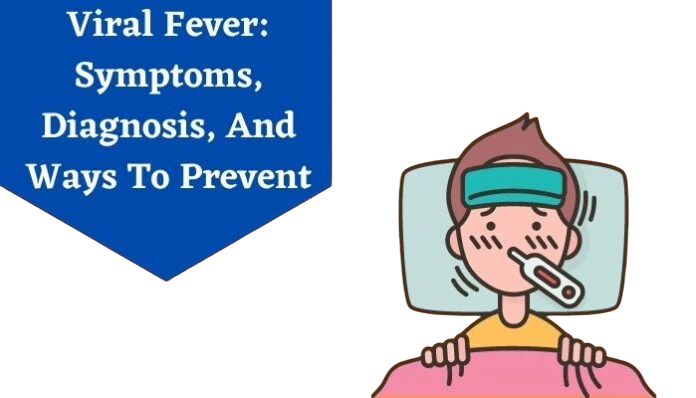Viral Fever Symptoms, Causes, Duration, Types and Treatment

symptoms, causes, effects or prevention of viral fever.
We all are aware the climate keeps on changing and due to this many types of diseases and illnesses have been introduced to all human beings. When it comes to talking about the current phase some new kinds of viral fever have come up that are quite the same as all other viral fevers including the same symptoms. However, people better know about how to treat such sicknesses. Well, if you are also one of those who are looking for viral fever symptoms, causes, and prevention tips, then the article is going to help you.
The change in the climate or weather often brings viral fever which is a common ailment that can affect individuals of all ages. It is often characterized by a sudden onset of symptoms such as fever, body aches, and fatigue. While viral fevers are typically not severe, they can still be quite uncomfortable. People often get worried thinking about how long will it last or how much time will it take to go away. Hence, here we will talk about how long viral fever usually lasts, what viral fever symptoms are in adults and children, and lastly, some effective ways to alleviate its discomfort.
Causes of Viral Fever –
If you are also worried about the fever and keen to know about some common viral fever symptoms and causes of sickness then here are some major and usual signs that you can find in your body if you are suffering from the condition.
- Fever: A typical viral fever may have a temperature ranging from 100°F to 104°F (37.8°C to 40°C).
- Body Aches: Muscle and joint pains are often experienced during a viral fever.
- Fatigue: Viral infections can lead to extreme tiredness and weakness.
- Headache: Many people with viral fever report experiencing headaches.
- Sore Throat: In some cases, viral fever can be accompanied by a sore throat.
- Cough and Congestion: Respiratory viruses often cause symptoms like coughing and nasal congestion.
- Nausea and Vomiting: Some individuals may experience gastrointestinal symptoms such as nausea and vomiting during a viral fever.
How Many Days Does Viral Fever Last?
Many people have seen searching about the duration of the illness and it has become a major concern among everyone who is going through this. Well, The duration of viral fever can vary from person to person and depends on several factors. Including the specific virus causing the fever and the individual’s overall health. On average, viral fevers tend to last for about 3 to 7 days. However, some viral infections may resolve in a shorter period, while others can persist for a longer duration.
Types Of Viral Fever
Well, now that you have read almost everything about viral fever, you should also be in the swim about the types of Viral Fever. Being in the swim of types of viral illness will help you make the difference between a viral or any other sickness, so scroll on.
- Influenza and cold
- Coryza
- Laryngitis with viral bronchitis
- Adenovirus and rhinovirus infection
- Infection with the para influenza virus
How to Get Rid of Symptoms and Causes of Viral Fever
While there is no specific cure for viral fevers, there are steps you can take to manage the symptoms and promote a quicker recovery. Symptoms and causes of viral fever include various indicators like headache, vomiting, breathing issues, etc. Learn how to protect yourself from this and maintain your personal hygiene.
- Rest: Give your body the rest it needs to fight off the infection. Adequate rest allows your immune system to work more effectively.
- Stay Hydrated: Drink plenty of fluids, including water, herbal teas, and clear broths.
- Fever Reducers: Over-the-counter fever-reducing medications like acetaminophen (Tylenol) or ibuprofen (Advil) can help lower your body temperature and relieve discomfort.
- Warm Compress: Applying a warm compress to your forehead or on sore muscles can provide some relief from fever-related discomfort.
- Gargle with Warm Salt Water: If you have a sore throat, gargling with warm salt water can help soothe it.
- Avoid Spreading the Infection: If you have a viral fever, it’s essential to practice good hygiene, such as covering your mouth and nose when coughing or sneezing and washing your hands frequently to prevent spreading the virus to others.
- Consult a Healthcare Professional: If your fever persists for more than a few days, worsens, or is accompanied by severe symptoms, it’s important to seek medical attention.
Viral Fever Treatment!
Finally, saying this would not be bad, viral fever is common and typically resolves on its own within a week. While they can be uncomfortable. The symptoms can be managed effectively with rest, hydration, and over-the-counter medications. It’s crucial to listen to your body, get the rest you need, and consult a healthcare professional if you have concerns about the duration or severity of your viral fever. Remember that good hygiene practices can also help prevent the spread of viral infections to others, which is especially important during periods of illness.